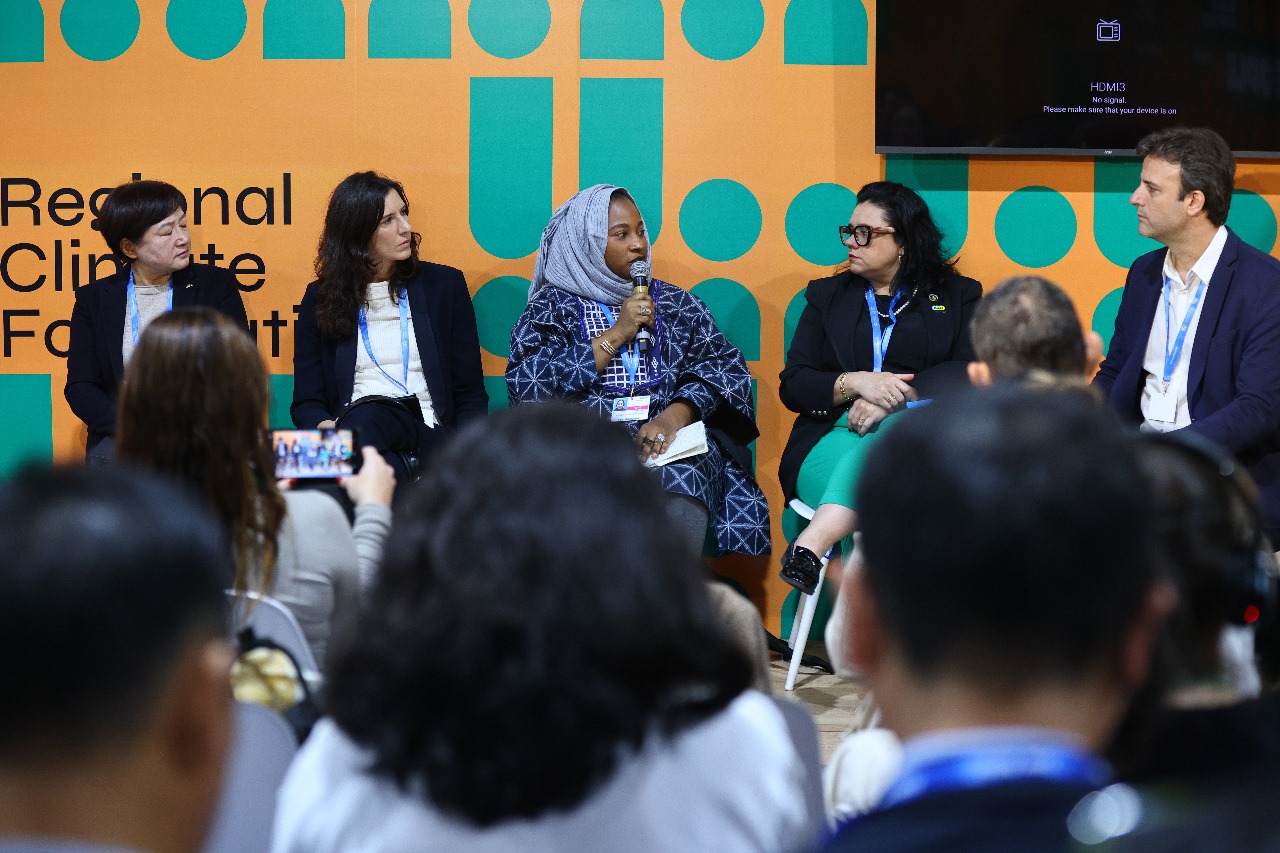Leaders from subnational governments met this Friday (15) morning in the Regional Climate Foundations Pavilion at COP29 to exchange experiences in prevention, adaptation, and mitigation of the worst impacts of climate change. They detailed to the audience some initiative they are carrying out and called for more financial resources and a support network to help them navigate the transition. “This is an important debate because although the goals are national, practical transformation happens locally”, said Marjorie Kauffmann, secretary of Environment of Rio Grande do Sul, the Brazilian most southern state.
On the stage, there were three women who lead the environmental departments of their states in South Korea, Brazil, and Nigeria. In the audience, two other representatives from Argentina and Australia took the microphone to also say some words. Besides being subnational actors, the three speakers had in common the fact that lead extremely vulnerable communities, either by their localization or the social situation.
The Jeju, for example, is the southernmost province of South Korea and consists of 63 islands: the “most affected area due to climate crisis” in the country, said Ae-suk Kang, who is the director general of Climate and Environment Bureau of the local government. Rio Grande do Sul, in southern Brazil, from where Kauffmann came from, had 95% of its territory devastated last May by an extremely strong flood. And Taraba state, located in the east of Nigeria, is vulnerable because of the lack of awareness of its people for the climate change. “My people are very ignorant, they live in denial of climate change”, lamented Aishat Barde, the local commissioner for Environment and Climate Change.
Naturally, the three of them had challenges to overcome. But they were unanimous in saying that not only money is required to climate action when it comes to the subnational level. “I make a call for support networking. We must know the best practices, we need that collaboration, to make this happen”, asked Barde.
Nigeria and Brazil also stated that they know that money is available, but to access it can be really difficult. Kauffmann remembered that after 10 extreme climate events in Rio Grande do Sul, in the last years, the local government decided to organize a task force for adaptation projects in the municipalities. But they couldn’t find personal in those areas with the required ability to make those projects. “Institutions need to support us not only with financial resources, but also with training and project development”, said the Brazilian representative.
A way to move forward was suggested by Kang, from Jeju province: “We are witnessing daily the nature signals of climate change. We must all work together and share experiences”, she concluded.
COP’s outcomes not only rely on negotiations
The request of subnational representatives for local action connects with another debate held in the RCF pavilion. A conversation about how to make the action agenda to be implemented fasten and efficiently. “Some years ago, the UNFCCC realised that to get a consensus, they need to involve other actors in the COPs that it wasn’t just the negotiating states”, introduced Nigel Topping, who was the High-Level Champion for COP26. “So, they decided to bring other voices as cities, states, regions, businesses, investors and civil society”, completed.
Nigel remembered that since them, the so-called “action agenda” was able to build up strong transformation, with commitments and progresses made in line with the NDCs, but executed by this other partners that don’t participate in the negotiations.
Daniela Lerário, a director at Climate Champions Team, remembered, for example, that the target established in COP28 of tripling renewable energy was preceded by serious commitments made by electricity companies of reducing their greenhouses gas emissions. “We have a lot of work to do, but it is also important to notice that actually we already did so much”, said.
Pedro Mariano, general-coordinator for Cooperation at Brazilian Ministry of Environment, assure that COP30, that will occur in Brazil next year, will have a strong commitment with the action agenda. “Brazil has a political tradition in working with civil society, with other stakeholders. So it is clear that COP30 will keep this characteristic”, said.
The speakers that work in the Climate Champions teams highlighted that action agenda is about listening and including people. “Things are happening, and
we need to make sure that the decisions are being made for people. We need empathy, humbleness and collaboration”, completed Lerário.
Projecting the impacts of climate policies
Besides collaboration and empathy, mathematics can also help to meet the targets. In another panel this Friday, Travis Franck, who is a director at Climate Policy Laboratory detailed a methodology of calculation that can show the impacts of climate policies both in economic and social contexts. The tool allows calculate the GHG emissions reductions also how the policies can contribute to GDP, jobs, and health co-benefits, among others. Using this model, policy-makers can study future scenarios, and adjust the targets.
Luisa Sierra, from the Mexican Institute of Development of Energy and Enviroment, and Agus Sari, chief executive officer at Landscape Indonesia presented the results their institutions got from the model.
Other countries are using the tool, including subnational governments in China, for example. This tool is relevant for identifying the policies needed to comply with the NDC and long-term emission reduction targets. It covers different sectors such as energy, transport, industry, buildings, and can incorporate market instruments such as carbon price, green taxes and subsidies that can boost the penetration of clean technologies and alternatives.








